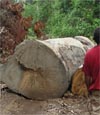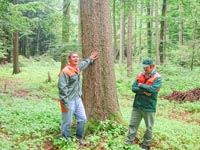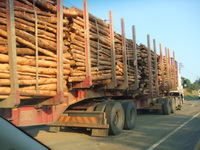15 years 2 months ago
You can read the full text of the Q&A here:
SNIP
Forests play a significant part in climate change: what is the Commission doing to stop deforestation and to put in place effective incentives for developing countries to stop deforestation and forest degradation?
Deforestation and forest degradation account for close to 20% of global emissions, more than the entire global transport sector. Rapid and significant emissions reductions from reduced deforestation and degradation (REDD) are essential to avoid global warming above 2°C. The 2008 EC Communication on deforestation underscored the...
15 years 3 months ago
Climate change mitigation support to emerging or developing countries should be given by western industrialized (so called ANNEX I) countries. In Copenhagen leaders of the world have agreed to start some financing activities in the fields of climate change aid. Our bosses had been in the opinion that it would make sense to immediately start these financing activities and therefore called it “fast start funding” or “fast start financing of climate change mitigation”. The program aims to initiate climate change mitigation activities in developing countries in the forefront of a new global...
15 years 3 months ago
Many people are questioning the difference between REDD and REDD+, here is the ultimate answer to them:
REDD stands for:
Reducing Emissions from Deforestation and forest Degradation
REDD+ or REDD plus or REDD-plus:
extends REDD by
Sustainable Forest Management
Conservation of Forests
Enhancement of carbon sinks
REDD++: Extends REDD+ by
Low-carbon but high biodiversity lands
Besides REDD or REDD+ or REDD++ you may be interested in retrieving more background knowldege in:
Is conservation the main deal of REDD+?
Is illegal logging the main reason of...
15 years 5 months ago
A note by the Editor of ForestIndustries.EU: We wrote this article a long time ago. Many significant events happened since then and a huge amount of new knowledge has been collected by the global community:
March 2013: Biodiversity in Logged Forests Far Higher Than Once Believed by Fred Pearce:- New research shows that scientists have significantly overestimated the damage that logging in tropical forests has done to biodiversity, a finding that could change the way conservationists think about how best to preserve species in areas disturbed by humans.
September 2013: Heavily logged forests...
15 years 5 months ago
July 20. 2010:Last week Guyana and Norway agreed to establish a very interesting partnership: the so called Guyana REDD+ Investment Fund (GRIF). Started last year in Copenhagen, a couple of countries decided to push the most promising climate mitigation action called ‘Reducing emissions from deforestation and degradation – in short REDD+ where the Plus stands for sustainable forest management, carbon enrichment and conservation.
Copenhagen - Paris - Oslo
First meeting after Copenhagen was organized by France President Sarkozy in Paris in March 2010 followed by a globally recognized...
15 years 5 months ago
October 2015: The Guardian simply ignores knowledge related to illegal logging and deforestation and furthermore isn't addressing the core problem of the EU FLEGT/EUTR/VPA initiative. Seems the just ongoing evaluation of the FLEGT/VPA/EUTR initiative will also not address the core problem and will just address the mismanagement of the process. There is still no political will to end this disingenuous campaign...
September/October 2012 - a note by the Editor of ForestIndustries.EU: We wrote this article more than two years ago. Many significant events happened since then and a huge amount of...
15 years 5 months ago
“Put the buzzwords deforestation, degradation, indigenous people and local communities, stakeholder process and carbon inventory in the terms of reference of your next forests based project and you can classify this project as a REDD+ project!”
It’s amazing to watch the growing number of so called “REDD” projects in the global queue of forest(ry) projects. One couldn’t believe what all those environmental NGO’s, social NGO’s, research institutes, development organizations, investment banks and power companies, to name just a view, must have missed the last years, when not taking care of...
15 years 5 months ago
Recently someone sent me a special issue about Ecosystem Services of the EU DG environment
When starting to read this leaflet I began to realize the difficulties of Central European Foresters (CEF) in understanding why the rest of the (biology/ecology/forestry) world is going to have endless discussions on how to differ between biodiversity and ecosystem services when applying forest management.
In the leaflet three studies where cited to come up with “surprising, groundbreaking” news on interactions of biodiversity, ecosystem services and forests (sorry for being this sarcastic)
Goldman, R....
15 years 6 months ago
June 11, 2010: The logging loophole - some thoughts about this issue:
Before you read further, just have a look here:
''This is a massive loophole. All rich countries except Switzerland are now trying to avoid the consequences of increasing the harvesting of forestry.''
Rich countries led by Russia, Australia and the EU have been accused of trying to cheat their way out of reducing their greenhouse gas emissions by creating "dishonest" forestry accounting loopholes.
EU MEMBER states and other developed countries have been accused of engaging in “creative accounting” to hide an estimated...
15 years 6 months ago
"The primary function of REDD+ is to realize green house gas emission reductions from forest ecosystems to avoid the worst effects of climate change. Apart from this substantial carbon sequestration and storage function, forest ecosystems harbor many important development benefits or ‘safeguards’ against disasters. These services underpin human well being, especially for those most vulnerable and for 1.6 billion forest dependent people, by providing fuelwood, timber, shelter, non-timber forest products such as fruits, medicines, gums, mushrooms as well as recreation and cultural services...






